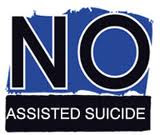By Wesley J. Smith, J.D., Special Consultant to the CBC
 The American College of Physicians has issued new ethical guidelines. It is making for interesting reading and may provide future fodder for us. But I wanted to discuss the College’s position on assisted suicide. First, it states that the College does not support legalization. That’s good. But, that and $2 will buy a small cup of Starbuck’s coffee since nothing will be done about physicians who do prescribe death where it is legal. From “American College of Physicians Ethics Manual” published in the Annals of Internal Medicine 2012; 156: 73-104 (no link):
The American College of Physicians has issued new ethical guidelines. It is making for interesting reading and may provide future fodder for us. But I wanted to discuss the College’s position on assisted suicide. First, it states that the College does not support legalization. That’s good. But, that and $2 will buy a small cup of Starbuck’s coffee since nothing will be done about physicians who do prescribe death where it is legal. From “American College of Physicians Ethics Manual” published in the Annals of Internal Medicine 2012; 156: 73-104 (no link):
The major emphasis of the College and its members, including those who lawfully participate in the practice, should be ensuring that all persons can count on good care through to the end of life, with prevention or relief of suffering insofar as possible, an unwavering commitment to human dignity and relief of pain and other symptoms, and support for family and friends. Physicians and patients must continue to search together for answers to the problems posed by the difficulties of living with serious illness before death, neither violating the physician’s personal and professional values, nor abandoning the patient to struggle alone.
Well, saying no isn’t allowing a patient to struggle alone. That point aside, this text is completely inadequate. If opposing assisted suicide is a matter of serious professional concern, there should be professional consequences for physicians who prescribe death. Doctors who help kill patients — or kill them, should active euthanasia become legal — should be drummed out of voluntary professional groups. That would dissuade many doctors from participating.
Yes, I know that Oregon and Washington law states that no professional consequences can apply to participating doctors. But those directives have always seemed a blatant violation of the First Amendment’s guarantee of free association to me. Thus, while I don’t think a doctor could be deprived of their licenses for participating in assisted suicide where legal or kicked out of any mandatory associations that come with licensing, they could and should be thrown out of voluntary medical associations.
Alas, before that will happen, these groups will need an infusion of the courage to enforce ethical principles. Unlikely, but I can always hope.
Author Profile
Latest entries
 Sperm DonationMarch 15, 2022Venus Rising with Edward Saulig: Reflections of a Sperm Donor
Sperm DonationMarch 15, 2022Venus Rising with Edward Saulig: Reflections of a Sperm Donor BioethicsMarch 13, 2022Dr. C. Ben Mitchell: 2022 Ramsey Award Winner
BioethicsMarch 13, 2022Dr. C. Ben Mitchell: 2022 Ramsey Award Winner #BigFertilityMarch 10, 2022Documentary Explores One Woman’s Journey through Egg Donation
#BigFertilityMarch 10, 2022Documentary Explores One Woman’s Journey through Egg Donation BioethicsMarch 9, 2022Questioning the “Science” of the Gender Industry
BioethicsMarch 9, 2022Questioning the “Science” of the Gender Industry

